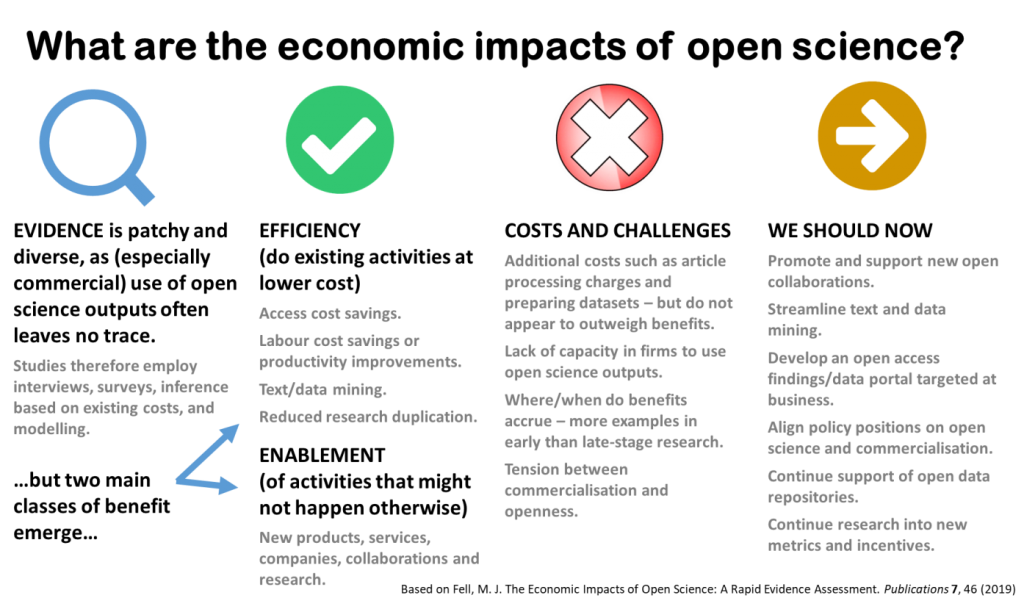Maximizing the Utility of Open Science

There is much to say in favor of open science, not least of which is that it only seems fair that the findings and data from publicly-funded research should be as widely accessible as possible. However, much of the political justification for open research policies argues, as Research Councils UK do in their open access policy, that it ‘offers significant … economic benefits.’ Is this a reasonable claim?
After conducting a review of the available evidence, I would suggest the answer is a qualified ‘yes.’ There are undoubtedly a range of positive economic impacts for different stakeholders, but also some important negative ones and barriers that we need to be aware of. In this post, I would like to set out some of the ways open research can yield economic benefits, but also develop an agenda as to how these benefits could be maximized.
Open, Efficient, Enabling
One caveat for all research on this topic is that the evidence base is patchy and diverse. Use of open science outputs (especially by non-academic parties such as firms) often leaves no obvious trace, so most evidence of impacts is based on interviews, surveys, inference based on existing costs, and modelling approaches. With these limitations in mind, I identified two main mechanisms by which economic benefits have been shown to be realized: efficiency (i.e. doing existing things at lower cost) and enablement (i.e. doing things that might not have happened otherwise).
Efficiency gains happen partly because academics, companies, policymakers, etc. don’t need to pay to access findings and data, but also if access becomes less time-consuming (therefore saving on labor costs). Labor (and transaction cost) savings are also available when text and data mining are made easier. Greater openness could additionally help avoid the inefficiency of redundant research, where (for example) companies investigate potential drug compounds that have already been shown to be ineffective.

Regarding enablement, there is evidence for open science leading to new products, services, companies, research and collaborations. One of the most interesting aspects of this was how well-designed collaborations can balance researchers’ requirement to be open, with the desire of firms (and universities) to commercialize discoveries. The Structural Genomics Consortium (SGC) manages this challenge through carefully designed governance, whereby firms can shape the research agenda in a confidential way, but protein structures are shared openly on discovery.
Openness does also come with costs and challenges. Some dispute the cost savings that open access publishing can bring. Just making findings and data more accessible does not mean that firms have the time and skills to make the most of them. There remain important questions around where the economic benefits accrue, with later stage drug development being notably less amenable to open approach than early-stage collaborations like the SGC. And how researchers balance a desire to be open with institutional pressure to publish in certain journals, or to commercialize their work?

Ensuring openness isn’t a missed opportunity
Based on these and other findings, I put together a list of recommendations which I believe could help maximize the economic benefits from open science. They are:
- Promote and support new open collaborations. General principles, guidance and support should be developed to balance a requirement for openness with corporate partners’ commercial considerations.
- Streamline text and data mining. The new EU directive on copyright has actually now gone a long way towards this, permitting mining by research institutions, but much more remains to be done in mainstreaming the approach.
- Develop an open access findings/data portal targeted at business.
- Align policy positions on open science and commercialization. It should be made clearer how institutions and researchers can navigate sometimes conflicting demands to commercialize their work while also maximizing the societal benefits through openness.
- Continue support for open data repositories. They’ve been shown to save time and money for users, while giving them access to useful new data.
- Continue research into new metrics and incentives. Better evidence is needed to show when positive economic impacts of open science occur, for whom and under what circumstances. Work to this end is underway.
The driver for most of these is the recognition that simply making findings and data freely available, while important, is only a small part of what is needed to maximize the value (economic or otherwise) of research. One way of thinking about this problem, is by considering and potentially mangling the old proverb, “you can lead a horse to water, but you can’t make it drink.”
At a basic level, the findings/data (the ‘water’) need to be presented in a way that makes them easy to consume – that is, with simple language summaries for findings, and well-described, clean data sets. Researchers, supported by their institutions and/or other actors, could go a long way to making these things the norm rather than the exception.
One way of doing this would be to explore alternative ‘ways in’ to research using existing cataloging services, perhaps using business sector and function, instead of academic discipline, as way of discovering the open findings/data. A level of business-focused curation also could be implemented, targeting appropriate users and pushing forward those articles or data sets, which are likely to be useful in a commercial context (for example data sets which can be easily linked with other data sets, or which provide ‘ground truth’ data for machine learning). An example of such an initiative is konfer, but this is fertile territory for innovation around specific sectors, institutions and alternative approaches.
When it comes to the users (the ‘horse,’ if you are still bearing with me on the analogy), there is likely to be an important capacity-building element. Universities could have a key role to play here, promoting the business (and other non-academic) benefits of open science outputs and providing support and training for those organisations seeking to extract most value from such outputs.

Economic benefits are by no means the only motivation to improve the openness of research – the implications for research quality, replicability, accountability and broader non-economic societal benefits are similarly important drivers. But knowing the mechanisms by which economic benefits come about, and how they could be maximized, are important parts of the picture that will likely be key to facilitating a transition to more open forms of research.
























































































